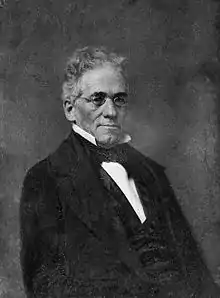George Bush (biblical scholar)
George Bush (June 12, 1796 – September 19, 1859) was an American biblical scholar, pastor, abolitionist, and academic.[1] A member of the Bush family, he is a distant relative of both President George H. W. Bush and President George W. Bush.[2]
George Bush | |
|---|---|
 | |
| Born | June 12, 1796 Norwich, Vermont, U.S. |
| Died | September 19, 1859 (aged 63) Rochester, New York, U.S. |
| Alma mater | Dartmouth College Princeton University |
| Occupation(s) | Biblical scholar, pastor, abolitionist |
| Signature | |
Biography
Born in Norwich, Vermont, Bush graduated from Dartmouth College in 1818, and then studied theology at Princeton Theological Seminary, where he was a tutor 1823–1824. He was ordained in the Presbyterian ministry, spent four years as a Christian missionary in Indiana, and in 1831 became professor of Hebrew and oriental literature at New York University.[3]
His first book, The Life of Mohammed, was the first American biography of the religious leader. It refers to Muhammad as "remarkable" and "irresistibly attractive", but is a largely negative assessment of him, depicting him as a fraud. It also takes a dim view of the state of Christianity of Muhammad's age. The book fell out of print, but became briefly controversial in Egypt in 2004.[4]
In 1844 Bush published a book entitled The Valley of Vision; or, The Dry Bones of Israel Revived. In it he denounced "the thralldom and oppression which has so long ground them (the Jews) to the dust," and called for "elevating" the Jews "to a rank of honorable repute among the nations of the earth" by restoring the Jews to the land of Israel where the bulk would be converted to Christianity.[5] This, according to Bush, would benefit not only the Jews, but all of mankind, forming a "link of communication" between humanity and God. "It will blaze in notoriety....It will flash a splendid demonstration upon all kindreds and tongues of the truth."[6]
Also in 1844, he published a monthly magazine called Hierophant, devoted to the elucidation of scriptural prophecies, and he issued, in New York, a work entitled Anastasis, in which he opposed the doctrine of the literal resurrection of the body. Attacks upon this latter work, which attracted much attention, he answered in The Resurrection of Christ.[3][7]
In 1845 he embraced Swedenborgianism and went on to write many defenses of his new faith.[8] He translated and published the diary of Emanuel Swedenborg in 1845, and became editor of the New Church Repository.[3]
Published works
- The Life of Mohammed: Founder of the Religion of Islam, and of the Empire of the Saracens New-York: Printed by J. & J. Harper 1831
- Treatise on the Millennium (1833)[3]
- A Grammar of the Hebrew Language (1st edition: New York, 1835; 2nd edition: New York, 1839)
- The Valley of Vision; or, The Dry Bones of Israel Revived (New York, 1844)
- The Resurrection of Christ; in Answer to the Question, Whether He Rose in a Spiritual and Celestial, or in a Material and Earthly Body (New York, 1845)[9]
- Illustrations of the Holy Scriptures (Philadelphia, 1845)
- The Soul; or an Inquiry into Scriptural Psychology, as developed by the use of the terms, Soul, Spirit, Life, etc., viewed in its bearings on The Doctrine of the Resurrection (New York, J.S. Redfield, 1845)
- Mesmer and Swedenborg (1847) Here he argued that the doctrines of Swedenborg were corroborated by the developments of mesmerism.[3]
- New Church Miscellanies (1855)[3]
- Priesthood and Clergy Unknown to Christianity (1857)
- Notes, Critical and Practical, on the Book of Genesis, 2 vols.
- Notes, Critical and Practical, on the Book of Exodus (Boston, 1871)
- Notes, Critical and Practical, on the Book of Leviticus
- Notes, Critical and Practical, on the Book of Numbers
- Notes, Critical and Practical, on the Book of Joshua
- Notes, Critical and Practical, on the Book of Judges (New York, 1862)
- Bible Atlas [3]
- Hebrew Grammar[3]
See also
References
- "Professor George Bush". The Friends of Zion Museum. Retrieved January 2, 2020.
- "Is the Author of a Book Critical of Islam an Ancestor of President Bush?". Archived from the original on November 12, 2008. Retrieved October 11, 2008.
{{cite web}}: CS1 maint: unfit URL (link), biographical statement issued by United States Department of State, December 20, 2004 - Wilson, J. G.; Fiske, J., eds. (1900). . Appletons' Cyclopædia of American Biography. New York: D. Appleton.
- "Reconsideration: George Bush I", Ted Widmer, New York Times Magazine, July 22, 2007
- Valley of vision: or, The dry bones of Israel revived: an attempted proof, from Ezekiel, chap. xxxvii, 1-14, of the restoration and conversion of the Jews, George Bush, 1844 "When the Most High accordingly declares that he will bring the house of Israel into their own land, it does not follow that this will be effected by any miraculous interposition which will be recognized as such....The great work of Christians, in the meantime, is to labor for their conversion. In this they are undoubtedly authorized to look for a considerable measure of success, though it be admitted that the bulk of the nation is not to be converted till after their restoration; for it is only upon the coming together of bone to his bone that the Spirit of life comes into them, and they stand up an exceeding great army."
- Power, Faith, and Fantasy by Michael B. Oren REVIEWED BY HILLEL HALKIN, Commentary, January 2007 "Power, Faith, and Fantasy by Michael B. Oren". Archived from the original on February 22, 2009. Retrieved May 12, 2009.
- Bush, George. The Resurrection of Christ. New York City University 1845. ISBN 9780598316547. Retrieved August 13, 2017 – via play.google.com/books.
- American Presbyterian review By Henry Boynton Smith, pg 185
- Bush, George. The Resurrection of Christ. New York City University. ISBN 9780598316547. Retrieved August 13, 2017 – via play.google.com/books.